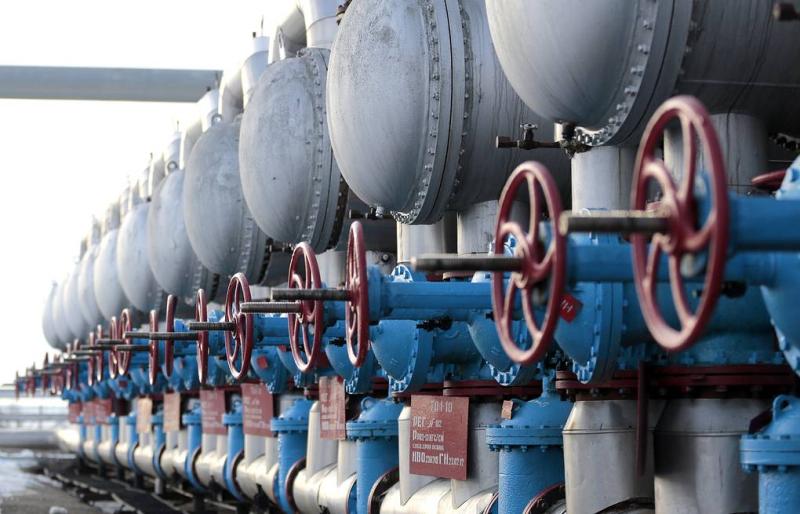
© Dmitriy Rogulin/TASS
On the night of September 26, gas pipeline operator Nord Stream 2 AG reported a sharp drop in pressure along one of the threads. And the next day, the same thing along with gas leaks were recorded on both Nord Stream 1 pipes. Today, the primary lead is a planned sabotage. The NATO meeting of September 30 saw Danish officials say that the pipelines were hit by two explosions worth 500kg of TNT each. Russian President Vladimir Putin had a conversation with Turkish President Tayyip Erdogan and gave a consistent treatment of the unprecedented sabotage, calling it an act of international terrorism.
According to former senior adviser to the US Defense Secretary Douglas McGregor, only the UK and the USA had the opportunity to inflict such damage. He is echoed by well-known American economist Jeffrey Sachs, who said the following in an interview with Fox News: "The destruction of the Nord Stream pipeline, which I would bet was a US action, perhaps US and Poland."
Pipeline diversions pose serious strategic risks to Europe’s energy security, as it keeps suffering from the energy crisis over anti-Russian sanctions. To overcome it, EU energy ministers have reached a political agreement to curb electricity prices. They particularly propose a price cap for green, nuclear and lignite generation, as well as mandatory savings during peak consumption hours. The European countries imply that amid gas shortages in winter or halted deliveries by one of the suppliers it will be possible to get back to purchasing Russian gas, with an agreement reached on the work of Nord Stream 1 and 2. Now this opportunity is gone, even technically.
For the time being, Russia retains supply to Europe via the Ukrainian gas transportation system (its truncated mode provides for a daily 40 million cubic meters, but there are concerns about lack of supply stability), as well as along the Turkish Stream (approximately 60 million cubic meters daily). A total of about 100 million cubic meters per day as compared to December 2021, when Russia’s daily volumes pumped to Europe amounted to 460 million cubic meters, i.e. 4.6 times more. For Europe, the remaining supplies are vital but insufficient.
Alternative vendors (Algeria, UAE, Norway, Qatar, USA) are not going to help, because they have increased supplies to Europe and thus approached the production and logistics limit.
So, the termination of Nord Stream 1 supplies is fraught with grave consequences. It is not even about the high cost of energy in the European market ˗ changes will be deeper.
Europe has stored impressive volumes of gas. But winter is coming, and natural gas consumption will be 2.5 times higher against summer months. As a result, Europe’s underground storage facilities (AGSFs) may empty out by February to reach 5-20% if Russian pipeline gas supplies to the region cease starting November 1, IEA experts claim. And all this amid limited LNG supplies. Besides, the lack of Russian supplies will make it challenging to fill AGSFs next winter. Such a drop in reserves will increase the risk of gas supply interruptions in case of late frosts. Therefore, gas saving measures are crucial to minimize extraction from the underground storage facilities and maintain reserves at an adequate level until the heating season ends. EU countries will have to undertake a partial transition from gas to coal generation, introduce an austerity regime and close "gas-intensive" enterprises.
The EU has been working tail off to stabilize energy prices, but the Nord Stream sabotage will derail its efforts. The "summer of discontent" may be followed by the "coldest winter", and "a larger wave of corporate bankruptcies and economic recession have come to the door of Europe," the Global Times newspaper writes.
The terrorist attacks will also produce an uneven playing field in the EU single market. Those to benefit will be economies traditionally less dependent on Russian energy as represented by Poland, Spain, Portugal, Sweden and Denmark.
France, the Netherlands and Belgium are more dependent on imports from Moscow but have access to LNG facilities and alternative pipeline routes.
Germany and Italy will face a 15% gas shortage. In particular, Germany is doomed to become a major victim of the Washington-unleashed war. The country's factories and plants have been forced to use some 20% less gas than a year before, spend more on every unit of output and lose out competition with firms headquartered in countries with lower energy prices.
The hardest part would be drawing up the energy balance in Central and Eastern Europe, critically dependent on Russia’s gas supplies. With deteriorating economic and social situation, they, along with Germany, could kick off supplies via Nord Stream 2 and resume pumping gas via Nord Stream 1. And yet they blew it after the terrorist attacks, which makes them only able to rely on Brussels or their neighbors, some of whom like Poland have voiced unwillingness to cut in.
As a result, a deep recession may begin in quite a number of EU economies this winter, as the Organization for Economic Cooperation and Development (OECD) warned in its recent interim economic forecast.
Some Western pundits, including those in the United States, are sure Europe will have to constantly and significantly overpay after the US government blew up the Nord Streams following its years-long attempts to sabotage them diplomatically. By destroying the EU-Russia link, the United States seeks to make the European Union a "power-hungry region growing poor." Thus, according to deputy editor-in-chief of iL Giornale Nicola Porro, it is payback time for the Europeans over their ill-considered energy policy.









